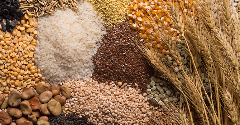News
Sweetness From Nature – Megatrend Versus Mainstream Business
22 Oct 2013“All natural” is a megatrend in the ingredient industry these days. Many new innovations are taking place throughout the whole ingredient value chain – from farming and manufacturing through to the product formulators and the FMCG marketers. The trend is being closely observed by both industry experts and consumers. More than half of all sweetener […]

“All natural” is a megatrend in the ingredient industry these days. Many new innovations are taking place throughout the whole ingredient value chain – from farming and manufacturing through to the product formulators and the FMCG marketers.
The trend is being closely observed by both industry experts and consumers. More than half of all sweetener discussions in the media, both in traditional and social networks, relate to stevia (58%), in contrast to aspartame (28%) or sucralose (14%). The high communication activity, especially in social networks and online forums, reveals that the natural sweetener concept is often not fully understood. When consumers’ perceptions were tested, Canadean Ingredients found that 79% of consumers knew that stevia is natural. However, 43% and 49% also believed that aspartame and sucralose were natural.
If an ingredient label lists “steviol glycosides from the stevia plant” or “sweetener: E960”, it can be expected to be interpreted differently by the average consumer. The situation is that many consumers do not interpret E numbers as a safety check, but instead interpret it to be that an ingredient with an E number is highly processed and risks being unsafe. Whether the interpretation is natural or synthetic, there is still a long way to go for a mainstream consumer product breakthrough.
Today, 2% of the global consumption volume of low calorie sweeteners in soft drinks is derived from stevia. In the North America and Europe market, 3.2% of non-caloric sweetener consumption is stevia-based. Although the consumption of global soft drinks with natural sweeteners in 2012 is small, it is constantly growing.
When calculating consumption based on the sweetness index, it is apparent that traditional sweeteners still have a significant impact within the soft drinks industry. One of the main reasons for this can be found in the more polarised consumption patterns of Western markets, which influence ingredient decisions for many new soft drink formulations. Consumers are less likely to consume sweetened carbonates (2010-2012 CAGR 2.04%) compared to bottled water (2010-2012 CAGR 6.39%), and they are even less likely to drink natural sweeteners that may be added to juices (2010-2012 CAGR minus 1.05%).
Today, many consumers are moving to drinks containing high sugar, such as energy drinks (2010-2012 CAGR 14.07%). This means they are embracing the less natural profile of these beverages, especially when they are offered as low-caloric versions, as they largely contain synthesised-intense sweeteners. Over the last three years, aspartame consumption in energy drinks grew nearly 20% in North America and 6.5% in Europe.
In 2012, sweetness consumption in energy drinks for all low caloric sweeteners was 325 MT (totalling a nutritional burden of zero calories) and non-caloric sugar types more than 1.1 million MT (totalling a nutritional burden of consuming 4.4 mio kcal). One might ask if this could become a new hot topic on the agenda for nutritional watch dogs.
Each consumer is different in terms of his or her idea of a perfect healthy lifestyle; it can be quite complex, as there are many different views of what is right and wrong/healthy or unhealthy for them. Today, health-conscious consumers may be seen drinking carbonates with normal sugar on a perfectly balanced and rational basis, and then there are other consumers who seem to be living a healthy lifestyle but indulge in high carb energy drinks or other performance beverages. Consumers may be drinking fruit-based carbohydrates, believing this is the healthier choice because of the lack of processed ingredients.
This contradiction between processed ingredients, nutrition and health may be due to groups of consumers’ mistrust in the industry. The main reason for the natural megatrend could well be that less-processed products are considered healthier amongst urbanised Western consumers, who have a romantic dream of foraging for their own food in the wild and growing their own vegetables. Many consumers expect the modern supermarket to be offering choices of healthy, natural products with origin declarations.
When comparing consumers’ attitudes in 2012 versus 2013, we saw there was no change in consumers’ perception of what is the healthiest choice in terms of sweetening agents, as the majority (47% in 2012 and 48% in 2013) still think that honey is the healthiest. However, the number of consumers believing sucralose is the healthiest sweetener has decreased from 16% in 2012 to only 4% in 2013, meanwhile the perception of stevia as the healthiest choice of sweetener has changed in a positive direction – from 9% in 2012 to 14% in 2013.
So the natural trend is booming – but as a mainstream business for the industry, it is still somewhat out in the future in terms of revenues. Consumers take information on board, but slower than industry has anticipated (or predicted).
Related news

Is the price of a sustainable and healthy diet… unsustainable?
4 Mar 2025
Healthier foods are more than twice as expensive per calorie as less healthy foods, with healthier food increasing in price at twice the rate in the past two years.
Read more
Does calorie labelling lead to reduced consumption?
27 Feb 2025
Calorie labelling of food products leads to a small, but consistent, reduction in the number of calories consumed, a study suggests.
Read more
Brands, retailers, and countries remain divided over Nutri-Score labels
30 Jan 2025
Europe's supermarkets and manufacturers are far from aligned over a standarised approach to nutrition labelling. Some welcome the non-mandatory Nutri-Score labels with open arms, while others have “considerable concerns”.
Read more
EU Parliament passes stricter packaging rules
20 Jan 2025
The European Parliament voted to approve updates to the packaging and packaging waste regulation, including enforceable re-use targets, limits on certain single-use packaging types, and restrictions on the use of PFAS “forever chemicals”.
Read more
Louis Drefyus Company powers on in plant-based with BASF ingredients acquisition
17 Jan 2025
BASF has agreed to sell its food and health performance ingredients business to Louis Dreyfus Company (LDC).
Read more
Major Belgian retailers promise standardised, reusable packaging at scale
16 Jan 2025
Albert Heijn, Aldi, Carrefour, Colruyt, Delhaize, and Lidl have launched a new reusable packaging coalition that aims to accelerate the use of reusable packaging, starting with mushrooms.
Read more
Kraft Heinz, Mondelēz, Coca-Cola, and Nestlé accused of marketing ‘addictive’ UPFs at children
15 Jan 2025
Major food manufacturers have been hit with a first-of-its-kind lawsuit alleging that they specifically engineer their ultra-processed foods (UPFs) to be addictive, and that they market the products towards children.
Read more
FDA reviews red food colour additive, Red No.3
9 Jan 2025
Amid considerations to tighten regulations around artificial ingredients, the US Food and Drug Administration (FDA) is exploring a potential ban on particular type of red food dye.
Read more
Sperri builds investment momentum with US expansion plans
7 Jan 2025
Hailed as Canada’s first organic and allergen-free plant-based meal replacement drink, food-as-medicine brand Sperri progresses its efforts to enter the US market.
Read more
Is it time for a global definition of whole grain?
30 Dec 2024
Amid a lack of harmonisation, the European Food Information Council (EUFIC) is calling for a global definition of the term whole grain to end consumer confusion.
Read more